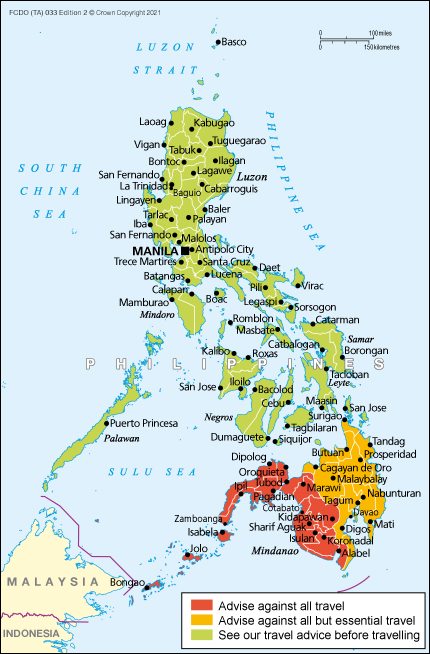Philippines
Summary

The Foreign, Commonwealth & Development Office (FCDO) advises against all travel to:
- western and central Mindanao and the Sulu archipelago because of terrorist activity and clashes between the military and insurgent groups.
The FCDO advises against all but essential travel to:
- the remainder of Mindanao (excluding Camiguin, Dinagat and Siargao Islands) due to the threat of terrorism. See Local travel and Terrorism.
COVID-19 entry restrictions for the Philippines
Before you travel, check the ‘Entry requirements’ section for Philippines’s current entry restrictions and requirements. These may change with little warning. Monitor this advice for the latest updates and stay in contact with your travel provider.
Travelling from and returning to the UK
Check what you must do to travel abroad and return to England, Scotland, Wales or Northern Ireland.
If you plan to pass through another country to return to the UK, check the travel advice for the country you’re transiting. If you will pass through a red list country, book your hotel quarantine package before travelling to the UK.
If you’re planning travel to the Philippines, find out what you need to know about coronavirus there in the Coronavirus section.
During the COVID-19 pandemic, it is more important than ever to get travel insurance and check it provides sufficient cover. See the FCDO guidance on foreign travel insurance.
For information about COVID-19 vaccines, see the Coronavirus page
It is estimated that over 200,000 British nationals visited the Philippines in 2018. Most visits are trouble-free.
Terrorists are very likely to try to carry out attacks in the Philippines. Terrorist groups have the intent and capability to carry out attacks anywhere in the country, including in the capital Manila and in places visited by foreigners, such as airports, shopping malls, public transport, including the metro system, and places of worship. You should remain vigilant at all times and report anything suspicious to the local authorities. See Terrorism
It’s likely that terrorist groups continue to plan kidnap operations against western nationals in the Philippines, both on land and at sea. Risks are particularly acute in Mindanao and the Sulu archipelago. See Kidnapping
Martial law was lifted across Mindanao on 1 January 2020. Monitor media reporting and follow the instructions of local authorities. A ‘state of national emergency on account of lawless violence’ remains in place across the rest of the country.
The Philippines is in an active earthquake zone and has numerous volcanoes. The country is also affected by around 20 typhoons each year, most of which occur between June and December. See Natural disasters
There’s a high incidence of street crime and robbery throughout the Philippines. You should take sensible precautions. See Crime
Prison sentences in the Philippines are severe. The judicial system can result in long-term detention until a court hearing takes place. Detention facilities are far below UK standards. Do not become involved with drugs of any kind. Penalties for importing and using illegal drugs are particularly severe. See Local laws and customs
The Philippines’ ferry and passenger boat network has a poor record of maritime safety. You should exercise caution when considering travel by inter-island ferries and avoid overcrowded boats. Accidents are more frequent during the rainy season between June and December when storms can develop quickly. See Sea travel
If you’re abroad and you need emergency help from the UK government, contact the nearest British embassy, consulate or high commission. Consular support is severely limited in parts of the Philippines where the FCDO advise against travel, and limited in the areas where the FCDO advise against all but essential travel. Full consular support is available in all other areas.
The Overseas Business Risk service offers information and advice for British companies operating overseas on how to manage political, economic, and business security-related risks.